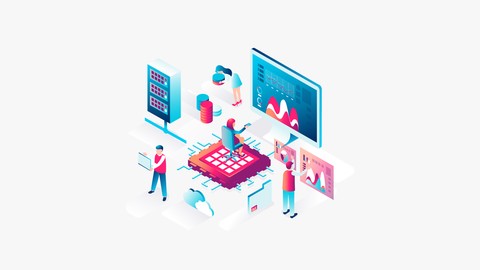
Basics of R for Data Science
Basics of R for Data Science, available at $19.99, has an average rating of 4.4, with 33 lectures, based on 5 reviews, and has 48 subscribers.
You will learn about Data Science intermidate level linear Regression This course is ideal for individuals who are Analytics Aspirants With R It is particularly useful for Analytics Aspirants With R.
Enroll now: Basics of R for Data Science
Summary
Title: Basics of R for Data Science
Price: $19.99
Average Rating: 4.4
Number of Lectures: 33
Number of Published Lectures: 33
Number of Curriculum Items: 33
Number of Published Curriculum Objects: 33
Original Price: $19.99
Quality Status: approved
Status: Live
What You Will Learn
- Data Science intermidate level
- linear Regression
Who Should Attend
- Analytics Aspirants With R
Target Audiences
- Analytics Aspirants With R
Data science is an interdisciplinary field that uses scientific methods, processes, algorithms and systems to extract knowledge and insights from noisy, structured and unstructured data and apply knowledge and actionable insights from data across a broad range of application domains. Data science is related to data mining, machine learning and big data.
Data science is a “concept to unify statistics, data analysis, informatics, and their related methods” in order to “understand and analyse actual phenomena” with data. It uses techniques and theories drawn from many fields within the context of mathematics, statistics, computer science, information science, and domain knowledge. However, data science is different from computer science and information science. Turing Award winner Jim Gray imagined data science as a “fourth paradigm” of science (empirical, theoretical, computational, and now data-driven) and asserted that “everything about science is changing because of the impact of information technology” and the data deluge. A data scientist is someone who creates programming code and combines it with statistical knowledge to create insights from data.
Data science is one of the trending fields. This course is designed for Data Science Enthusiasts who want to start their career in Data Science with R. You are required to have the basic knowledge of programming and you don’t need to be a superman in coding. This course is designed with simple examples for intermediate learners and its created with my young research team who are mastered in below concepts
Introduction to R,Overview of R,Data types in R,Basic Data management in R,Basic Flow control in R,Basic Graphs in R,Basic of Statistics, Linear Regression
Course Curriculum
Chapter 1: Introduction
Lecture 1: Introduction
Lecture 2: Basic Syntax
Lecture 3: Introduction To Data Structures In R
Lecture 4: Vectors
Lecture 5: Matrices
Lecture 6: Data Frames
Lecture 7: Matrices
Lecture 8: Arrays
Chapter 2: Data Importing
Lecture 1: Importing through Key Board
Lecture 2: Importing CSV Files
Lecture 3: Basic Functions in R
Chapter 3: Data Management
Lecture 1: Introduction To Data Management
Lecture 2: Dates
Lecture 3: Typecasting
Lecture 4: Renaming
Lecture 5: Sorting Merging Subsetting
Lecture 6: Math functions
Chapter 4: Basic Graphs
Lecture 1: Introduction T Graphs
Lecture 2: Plot function
Lecture 3: Bar plot
Lecture 4: Pie Chart
Lecture 5: Histogram
Lecture 6: Box plot
Chapter 5: Basic Statistics
Lecture 1: Introduction to statistics
Lecture 2: Descriptive statistics
Lecture 3: Frequency and Contingency Tables
Lecture 4: Statistical Functions
Lecture 5: Correlation
Chapter 6: Linear Regression
Lecture 1: Analytics life cycle
Lecture 2: Types of Learnings
Lecture 3: Linear Regression Theory
Lecture 4: Model Evaluation
Lecture 5: Implementation of Linear Regression
Instructors
-
Prof. M. NAGABHUSHANA RAO , Team, MLRITM, Hyderabad – INDIA
R Programming Language Basics
Rating Distribution
- 1 stars: 0 votes
- 2 stars: 0 votes
- 3 stars: 1 votes
- 4 stars: 3 votes
- 5 stars: 1 votes
Frequently Asked Questions
How long do I have access to the course materials?
You can view and review the lecture materials indefinitely, like an on-demand channel.
Can I take my courses with me wherever I go?
Definitely! If you have an internet connection, courses on Udemy are available on any device at any time. If you don’t have an internet connection, some instructors also let their students download course lectures. That’s up to the instructor though, so make sure you get on their good side!
You may also like
- Top 10 Language Learning Courses to Learn in November 2024
- Top 10 Video Editing Courses to Learn in November 2024
- Top 10 Music Production Courses to Learn in November 2024
- Top 10 Animation Courses to Learn in November 2024
- Top 10 Digital Illustration Courses to Learn in November 2024
- Top 10 Renewable Energy Courses to Learn in November 2024
- Top 10 Sustainable Living Courses to Learn in November 2024
- Top 10 Ethical AI Courses to Learn in November 2024
- Top 10 Cybersecurity Fundamentals Courses to Learn in November 2024
- Top 10 Smart Home Technology Courses to Learn in November 2024
- Top 10 Holistic Health Courses to Learn in November 2024
- Top 10 Nutrition And Diet Planning Courses to Learn in November 2024
- Top 10 Yoga Instruction Courses to Learn in November 2024
- Top 10 Stress Management Courses to Learn in November 2024
- Top 10 Mindfulness Meditation Courses to Learn in November 2024
- Top 10 Life Coaching Courses to Learn in November 2024
- Top 10 Career Development Courses to Learn in November 2024
- Top 10 Relationship Building Courses to Learn in November 2024
- Top 10 Parenting Skills Courses to Learn in November 2024
- Top 10 Home Improvement Courses to Learn in November 2024






















